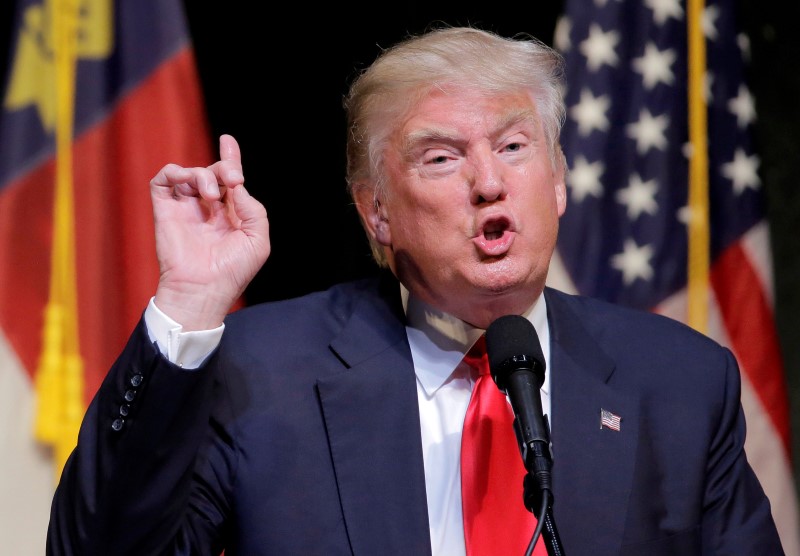By Trevor Kincaid
March 5 (Reuters) - Donald Trump's tough trade talk has the world on edge. With the stroke of a pen, he could unravel the global trading system, raise prices on basic goods, make American businesses less competitive, drive a wedge between the United States and its European allies, and open the door for China to construct new national security based trade barriers.
The U.S. president would also be missing a genuine opportunity to establish a positive legacy on trade.
Trump's plan, which shocked markets last week, would raise tariffs – or taxes – on the steel and aluminum used to make everything from car engines to skyscrapers to beer cans. It's basic economics: when taxes go up on the inputs of manufacturing, higher costs are passed onto consumers. Economists agree that Trump's policy would threaten far more American jobs than it would protect.
Global analysts are watching closely. World TradeOrganization Director General Roberto Azevêdo recently said thatthe “potential for escalation is real, as we have seen from theinitial responses of others. A trade war is in no one'sinterests. The WTO will be watching the situation very closely.”
Trade wars do not benefit anyone. Most people living todaydon't remember the last trade war, which is blamed for worseningthe pain of the Great Depression and, by some accounts, helpingto foster the political extremism that led to World War Two. Itstarted with the Smoot-Hawley Tariff Act, passed by Congress in1930 – despite warnings from U.S. allies – under the guise thatraising import duties would protect American businesses andreverse trade deficits. Those new taxes were met with anaggressive response from America's trading partners. The damagewas severe and rapid: from 1929 to 1933 U.S. imports decreased66 percent and U.S. exports decreased 61 percent. Workers lostjobs, farmers lost customers and household items got moreexpensive.
Trump is inches away from igniting a similar tit-for-tattrade war with America's largest trading partners. Once theUnited States imposes higher tariffs, Europe is likely torespond immediately by targeting key American exports; China,Canada and Mexico could also retaliate with their own punitivemeasures. Trump has already said he would then up the ante andwork to raise tariffs on cars coming into the United States fromEurope – although that would require a formal process or an actof Congress.
Trump's aluminum and steel tariffs will drive up the priceof everyday household items at a time many are alreadystruggling with high health care costs and rising gas prices.Commerce Secretary Wilbur Ross, who made billions in the steelindustry, brushed aside concerns that middle-class Americanswould object to paying more. “Who in the world is going to betoo bothered?” he asked rhetorically.
Meanwhile, American industries that are unable to export toimportant markets could be forced to decrease production, cuthours, lay off workers, and potentially close their doors.
The national security rationale for unleashing this economicpain is perplexing. It could easily backfire and set a precedentthat makes the United States even less secure. America's topsteel exporters include allies like Canada, South Korea, Mexico,and the European Union. China ranks eleventh. Trump's weakargument could empower China – and other countries – to erecttheir own trade barriers under the cover of vague nationalsecurity arguments.
It was this concern that drove the Obama administration tochallenge China's tariff increase on rare earth exports at theWTO. Rare earth elements are used to manufacture hybrid carbatteries and wind turbines; they're also used to produce lasertargeting devices and the F-35 Lightning II joint strikefighter. The Obama administration teamed up with Japan and theEU to confront China and won – keeping Pandora's box closed andstrengthening the rules based trading system.
When the world was picking up the pieces from World War Two,America led the way in constructing a rule-based framework forinternational commerce. Those rules and institutions have givenconfidence to countries large and small for nearly 100 years,providing a peaceful and fair forum for dispute resolution.
Enforcement of international rules is key to the health ofthe system and the success of any trade agreement; withoutaccountability the system can't run. If Washington circumventsthese rules to pursue a rogue approach, Trump will preside overthe abdication of U.S. leadership and the ascension of Chineseinfluence. He will turn America's back on the system it built.
Trump isn't alone in the view that there is a globalovercapacity in steel production, and that China is the cause.G20 nations established the Global Forum on Steel Excess toaddress this global steel glut. But this system needs help andit needs reforms. The opportunity exists for Trump to craft apositive legacy on trade. Not through dismantling theinternational order but by strengthening and updating it.
America should draw a hard line with China. There areimbalances that exist between China and the rest of the world,and run afoul of their commitments. While most WTO members opentheir markets, China closes theirs. The EU and the United Statesoperate under the rule of law, yet China steals intellectualproperty that has required investments of time, money, andtalent.
(Trevor Kincaid was the Deputy Assistant U.S. TradeRepresentative for Public Affairs in the Obama administration.The opinions expressed here are his own.)
There are ample opportunities for Trump to lead. But a hardline doesn't have to mean hardship.
